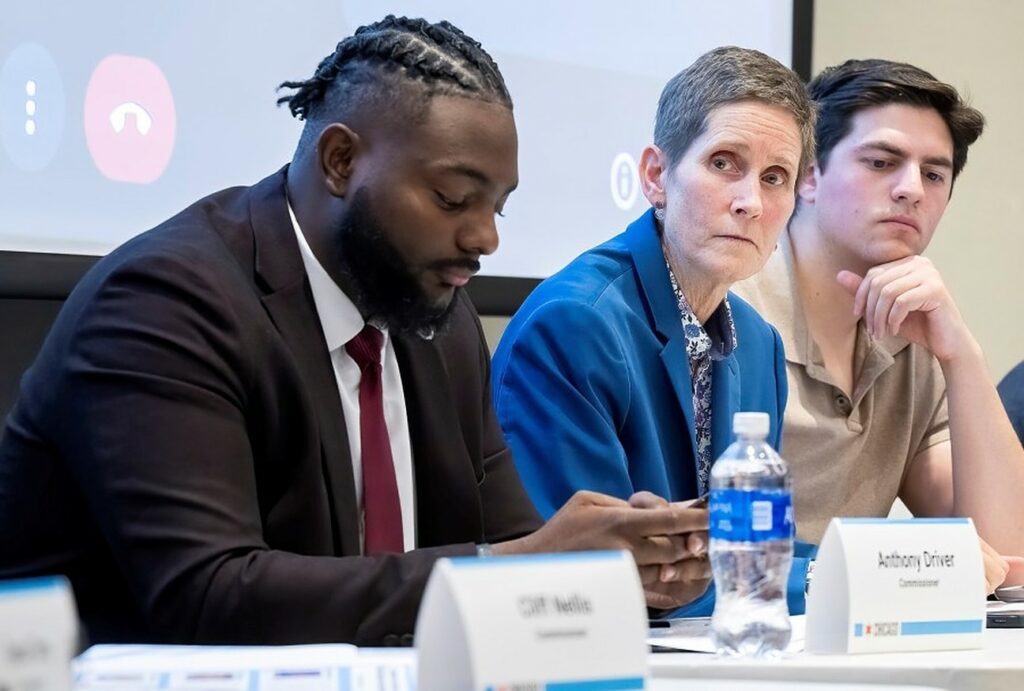The first meeting of a new police accountability board was on September 29, and members are concerned that Chicago police leaders are already attempting to circumvent their powers.
After ten years of political organization by Chicago residents outraged by police brutality, the Community Commission for Public Safety and Accountability was founded. One of the board’s responsibilities is to unanimously approve all new police rules put in place by so-called “General Orders.”
Consequently, they were startled when police authorities informed commissioners just one month after they entered office that a contentious new gang database would be implemented by the end of the month via a “Special Order.”

Anthony Driver, the commission’s president, said: “Even if it wasn’t planned, it is a technique to sidestep this commission.” I don’t believe it will succeed.
The action by CPD comes as the newly formed civilian oversight board works to solidify its authority to speak for the preferences of city residents regarding how the Police Department should be conducted.
Driver stated his cooperation was required by the ordinance that established this commission. “That’s not what’s happening right now,”
The tracking of people who are supposedly connected to gangs by the Chicago Police Department has come under question recently. Despite CPD’s assertion that it needed to gather the data to investigate crimes, a report by the city’s top watchdog found that earlier editions of gang data were rife with mistakes and disproportionately targeted persons of color.
Driver declared that approving the recently proposed gang database was a major priority at the commission’s first meeting.

He claimed that a week later, the police department abruptly notified commissioners that the policy would go into effect at the end of October and that the commission would only be given a briefing on it a few days beforehand.
Driver claimed that he requested the department to delay the regulation right now.
Driver claimed that at a briefing with police authorities, the vast majority of the commission’s inquiries were unanswered. And the commission unsuccessfully tried to arrange a meeting with CPD for the following three weeks to voice its concerns about the policy.
The commission was then informed by CPD in early November that a draft of the policy would be made available to the public until December 7 and that the database would go into force soon after.
We felt taken by surprise, Driver remarked. At that time, we decided to hold a hearing on this and force them to appear before the commission if they refused to schedule a meeting with us.
During that meeting on November 28, commission members questioned a number of CPD employees about how the new database would vary from the previous one. But despite numerous attempts, Driver was unable to learn why CPD wrote the policy as a “Special Order,” which, unlike a “General Order,” is not subject to the commission’s jurisdiction.
Robert Owens with the Office of Inspector General in Chicago claims that early versions of the gang data policy were produced as general orders in 2020. Then it was downgraded to a “Special Order” in November 2021.
Driver questioned the timing of this reclassification because the commission had only been created by the Chicago City Council in July of 2021, which was only four months earlier.
Lt. Brian Kapustianyk found it difficult to articulate the change’s justification to the commissioners during the meeting.
The manuscripts that we were changing, reformatting, and trying to get to the appropriate spot had many differences, according to Kapustianyk. “For this reason, it was classified as a special order. We clearly stated at that point that we were ceasing to use the older method.
The Police Department was unsure of the purpose behind the gang database’s designation as a special order. Additionally, the administration did not address worries that the agency is evading the new commission.
Cliff Nellis, a commissioner and defense lawyer, expressed dissatisfaction with the CPD’s approach.
Nellis added that it defies logic for CPD to solicit public feedback by publishing the policy online for comments while ignoring the commission’s suggestions.
On the one hand, they argue that we want feedback from the public, Nellis noted. And on the other side, how much power do we have as a group that is intended and created to offer complete, all-encompassing, hyperlocal, community-level feedback into these practices?
Following another perceived blow to the panel, a report they wrote in early November that was critical of the projected police budget was mostly ignored. This led to the conflict over the gang database.
The analysis concluded that because the police department does not currently have a long-term, data-driven strategy to minimize violence, it is not using its money efficiently or fairly.
The commission concluded that this “may increase the danger of injury or death for Chicagoans, particularly those who reside in communities with a high concentration of Black and Brown people.”
The projected $1.94 billion police budget was approved by the City Council four days after that report was released.
Driver said some hiccups are inevitable because the newly constituted commission’s jurisdiction is still being established. But he expects that going ahead, the Police Department will work more cooperatively.
Chicago can only get safer if we cooperate, according to Driver. And this has seriously hampered our capacity to inform the public and exercise our oversight authority to weigh in on these important topics by not giving information and by not meeting with the commission until the very last minute.

